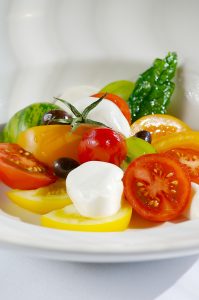One article in today’s Cancer Research Update looks at a study on how specific snack choices may affect the amount you need to eat to be satisfied. While it’s too early to draw conclusions from this study, we do know that our snacking habits are changing and not for the better.
Americans snack more often than we did 35 years ago and we’re eating more calories than in 1977, according to the 2008 National Health and Nutrition Examination Survey (NHANES).
In 1977 Americans reported, on average, eating about 3.9 times a day and now – about 5.6 times a day. Snacks now account for about 1 out of every 4 calories we eat – twice as much as 35 years ago.
And, we are eating more – about 200 calories more every day.
Some of the calorie increase is coming from carbohydrate rich foods. This includes sugar-sweetened beverages often consumed as a snack. Today, for those who drink sugary beverages, the average daily amount is 23 oz., 100 calories more than 35 years ago.
The snacking has not helped us eat more vegetables; in fact the survey shows we are eating fewer vegetables today.
These trends may explain our increasing waistlines because sugary beverages are linked to overweight and obesity and eating more vegetables may help people stay a healthy weight.
In addition, obesity is a major risk factor for many common cancers and a diet high in vegetables is linked with lower risk for several cancers.
Snacking can be a positive part of a healthy diet – here are some tips to make your snacks count toward health:
- Portion out your snack onto a small plate or bowl. If you eat out of the package or nibble every so often, it’s easy to eat more than you need to satisfy your hunger.
- Focus on filling most of your snack plate with low calorie foods such as fruit and vegetables. Add a little lean meat, dairy or a few nuts for some protein which can help stave off hunger later, just keep the portions small.
- Limit your snacking to times when you are truly hungry and not just bored or looking for a break. If you need a break – stretch, walk or step outdoors for some fresh air.
- Drink more water and other non-calorie beverages like unsweetened tea. Sugary drinks don’t keep you satisfied as long as food does.
- Try logging everything you eat using a notebook, an online food tracker or an app. That can help you be aware of what and how much you’re eating, so you can make choices for health and be smart with indulgences.
Here are recipes for a couple of special vegetable snacks.
What are your go-to snacks that keep you satisfied but don’t weigh you down?






